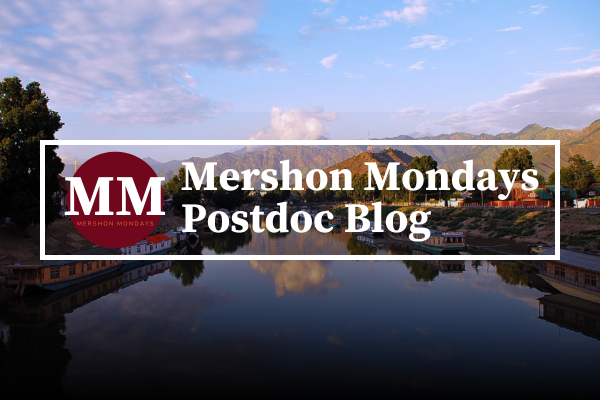Postdoc Blog: Madhumita Dutta Doing River Ethnographies

At our Mershon Monday event on September 16th, Professor Madhumita Dutta, Associate Professor of Geography and Faculty Affiliate in Women’s, Gender, and Sexuality Studies, presented her ongoing ethnographic research on Indus Basin rivers in India.
Professor Dutta is part of a Mershon-sponsored research collaboration that brings together OSU faculty—including those from the Department of Geography, the Department of History, and the Byrd Polar and Climate Research Center—and scholars, photojournalists, and conservationists in India. As Professor Dutta discussed last Monday, the metaphor of “confluence” captures both the rivers themselves and the blending of academic disciplines used to comprehend their complexity. Methodologically, this work conceptualizes rivers not only as physical landscapes but also as lifelines that bind the region’s communities, economies, and histories.
Historical conflicts shape the region through which the Indus Basin rivers flow. Parts of the region have witnessed and experienced armed rebellion and militarization since 1989, and the rivers and their peoples have become deeply entangled in these processes. However, viewing these waterways solely through the lens of conflict risks overlooking their local, cultural, spiritual, and historical significance. Thus, Professor Dutta’s research, “river ethnographies,” foregrounds the “social life of rivers,” emphasizing their role in sustaining local livelihoods and their centrality to lived experiences. Professor Dutta discussed how small villages along the rivers work to protect trees and preserve fish sanctuaries. Communities rely on these waterways for sustenance and work: life on houseboats, artisanal sand mining, and traditional fishing practices persist.
One story Professor Dutta shared was that of a Chinar tree, which has grown at the confluence of the rivers Sindhu (Indus) and Jhelum in the Kashmir Valley. For over a century, the tree has served as an important spiritual site. Cared for by a Muslim family for over 150 years, the tree and the Shiva Linga (a Hindu god) hold religious significance for both Muslim and Hindu communities—a symbol of syncretic practices that abound in the Indus River Basin. A man from the Muslim family offers prayers and cleans the Shiva Linga twice every day. He also ferries visitors by boat to the tree, situated in the middle of the river, for a nominal fee. On the side, he sells tomatoes, local snacks, and tea from his little shop by the riverbank—embodying how spirituality, tradition, and livelihood strategies come together along the rivers.
Professor Dutta’s research approaches are innovative. Her local research team is undertaking a 10-day river walk, connecting with local communities and planning further ethnographic research. In a heavily militarized zone, where language barriers and military restrictions complicate fieldwork, local partnerships make this research possible.
Rather than romanticizing the rivers, Dutta’s research team seeks to tell grounded, complex stories about the persistence of culture and livelihoods amidst conflict.
On a practical level, coordinating this ethnographic project with international collaborators requires ongoing organization. The team holds Zoom meetings every two weeks to discuss research progress. As Professor Dutta noted, like the rivers they study, ethnographic research can sometimes be unpredictable and complex. By treating rivers as active agents in the region’s story, rather than mere resources, this research is opening new pathways for understanding the rivers of the Indus Basin, its landscapes, and its people.
